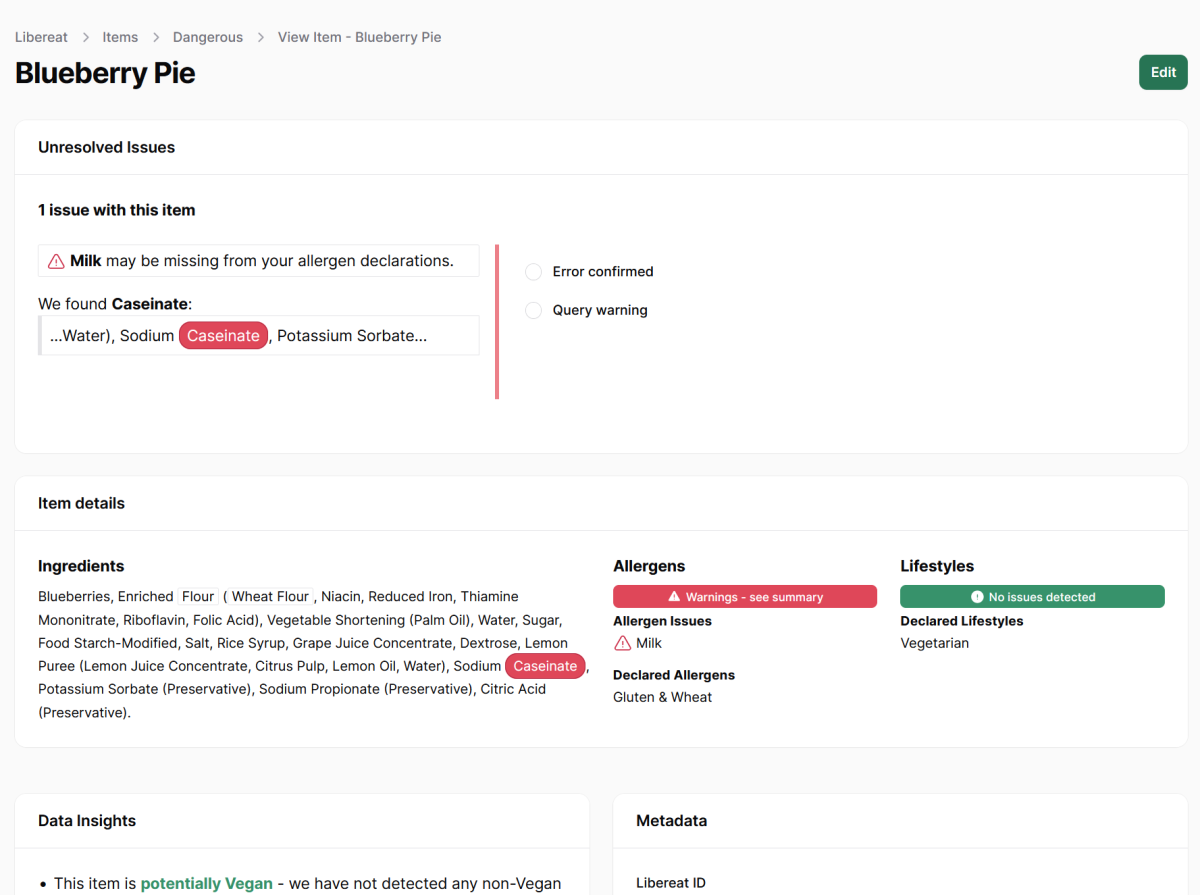Avoiding Vegan and Vegetarian Labelling Errors
Vegan and Vegetarian Labelling Errors: The Overlap with Allergen Management
The rise of plant-based diets and the growing demand for vegan and vegetarian food have transformed the food industry.
However, as more products are labelled vegan or vegetarian, two critical issues arise:
- Errors in food data concerning allergens and vegan or vegetarian ingredients.
- The potential for allergen risks due to cross-contamination.
Mislabelled vegan or vegetarian foods can pose severe health risks, especially for individuals with allergies or intolerances.
Vegans and vegetarians also expect products bearing these labels to be accurate.
Yet, manual data entry and checking processes can create significant challenges behind the scenes. These methods are prone to human error, often resulting in mislabelling. Mislabelling, in turn, can lead to consumer injury, loss of trust, and costly recalls or legal issues for food brands.
This issue is pervasive but rarely flagged in the industry despite its critical impact on consumer safety and brand reputation.
The Overlap Between Vegan Labelling and Allergen Management
Vegan food, by definition, should contain no ingredients derived from animals. However, the absence of animal-derived ingredients does not guarantee that a product is free from allergens.
Products labelled vegan are often produced in facilities where non-vegan items are handled, creating cross-contamination risks with allergens like milk, eggs, or fish during production, packaging, or storage.
For instance, a product labelled “vegan” may still contain traces of milk or eggs if these are present in the same facility.
Vegan consumers who also suffer from allergies induced by milk, for example, may expect that a vegan product is safe for them to consume.
This cross-contact risk is particularly concerning for individuals with food allergies, who rely on clear and accurate labelling to avoid potentially life-threatening reactions.

Why Vegan Labelling is Not the Same as ‘Allergen-Free’ Labelling
Vegan labelling ensures that no animal-derived ingredients are intentionally used but does not provide the same guarantees as allergen-free labelling.
The Vegan Society Trademark certifies products as vegan, which is recognised globally. However, it does not require stringent allergen control measures.
In contrast, allergen-free labelling, e.g., gluten-free, milk-free, and nut-free, requires businesses to implement rigorous protocols to prevent cross-contamination, such as dedicated production lines, segregated storage, and validated cleaning processes.
Unlike allergen-free labelling, vegan labelling operates within a less stringent framework, meaning robust allergen risk management strategies remain essential for vegan products.
The Hidden Problem: Data Errors in Labelling Processes

One of the most overlooked issues in vegan and allergen labelling is the high prevalence of data errors.
Many food safety processes rely on manual data entry and human checks, which are inherently prone to mistakes.
These errors include:
- Misidentifying ingredients as vegan or allergen-free.
- Missing critical cross-contamination risks in supply chain data.
- Failing to reflect ingredient changes in updated labels.
LiberEat has identified thousands of live errors in menus, labels, and online platforms, uncovering discrepancies such as undeclared allergens or mislabelled vegan products. These errors can slip through even the most careful manual processes, demonstrating the need for technology-driven solutions.
Key Areas for Preventing Labelling Errors and Risks
Food businesses usually take the following measures to minimise risks associated with vegan labelling and allergens:
Implement Comprehensive Risk Assessments: Evaluate production, storage, and handling processes to identify cross-contamination risks.
Using Precautionary Allergen Labelling (PAL): Provide clear “may contain” statements informed by thorough risk assessments.
As industry guidance outlines, PAL should only follow a thorough risk assessment rather than substitute for proper food safety practices.
Verifying Supplier Information and Specifications: Ensure all ingredients comply with vegan or allergen-free claims by validating supplier data.
Training Staff & Empowering Teams: Empower teams to communicate labelling information accurately and transparently.
Adhering to Regulations: Food businesses must comply with food safety laws, including the UK’s implementation of Regulation (EU) No 1169/2011, which mandates transparent allergen declarations.

Why Technology is Key to Managing Vegan and Allergen Risks
Managing vegan claims and allergens is complex, but innovations in industry technology can ensure consistency and accuracy.
LiberEat’s technology transforms this process by detecting errors in ingredient data that food safety teams can otherwise miss.
How LiberEat Helps:
Error Detection: Identifies labelling inconsistencies, undeclared allergens, and vegan/vegetarian claims.
Real-Time Alerts: Notifies teams of potential issues before products reach consumers.
Data Validation: Ensures compliance with vegan and allergen labelling standards.
LiberEat reduces reliance on manual processes, helping businesses avoid costly mistakes, protect consumer trust, and enhance food safety.

Ensuring Food Safety and Consumer Trust
Vegan and vegetarian labelling intersects with allergen management, presenting unique challenges for food safety teams.
While vegan labelling guarantees the absence of animal-derived ingredients, it does not ensure allergen safety.
LiberEat as your Food Safety Partner
Find dangerous errors in your allergen data in real time and fix them before they reach a consumer.
Using LiberEat’s innovative technology, food businesses can automate and streamline allergen management to prevent costly and potentially dangerous errors.
LiberEat helps food safety teams detect allergen labelling errors and inconsistencies across supply chains, packaging, and menus. It supports compliance with UK and U.S. regulations, including Natasha’s Law and FALCPA.
LiberEat’s platform empowers food businesses to protect consumer health, reduce recall risks, and maintain trust by providing real-time alerts and automated data checks.
Get in touch to learn how LiberEat can support your allergen management and compliance needs, ensuring your business stays on top of food safety regulations.

